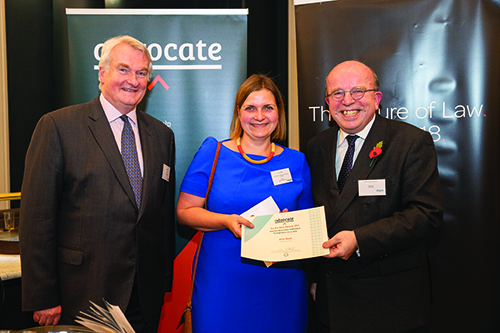*/
Despite it only being the second year of the Bar Pro Bono Awards having a full roster of categories honouring voluntary work, it already feels like a fixture in the Autumn calendar and an important event, central to Pro Bono Week. Leaders of the Bar including the Lord Chief Justice, Chair of the Bar and Director of the Law Centres Network met to judge the 2019 Bar Pro Bono Awards.
Garnering solid support from across the sector in the form of Headline Sponsorship from Lexis Nexis and support for individual awards from the DX, Juriosity, the Legal Practice Management Association, Place Campbell and Therium Access, it is important also to acknowledge the kind support of hosts Child & Co, as well as the Bar Council, without which the awards could not take place.
Recognising excellence and impact right across the Bar, the nominations are truly worth a read. They can be found online here. The stories are surprising, moving and inspiring. The breadth of pro bono work being done by your colleagues, in every corner of the law, will excite you, as it does us.
Junior barrister Sanaz Saifolahi, Goldsmith Chambers, was recognised by the judging panel as Highly Commended, for her outstanding work on the notable Banger immigration case which will affect those in similar situations for years to come. She worked on a number of other challenging cases and is described as someone “always willing to fight for the rights of those who are the most disadvantaged in society”.
Judges found it incredibly difficult to choose between the barristers nominated as Young Pro Bono Barrister of the Year 2019, and also felt it necessary to issue a Highly Commended. This is to Miriam Smith, 5 Paper Buildings, for her impressive work representing a victim of repeated domestic violence, assisting the parents of a man who died in 2017 following his detention by two members of the public and on a Court of Appeal Civil Division appeal led by the QC who nominated her. Her chambers Business Manager said he has never met or worked for anyone more deserving of the award.
At the Bar Pro Bono Awards evening, Mr Justice Knowles, Chairman of Advocate, standing in for Lord Goldsmith QC (Chair of the Judging Panel), was also delighted to recognise Alice Nash of Hailsham Chambers, as the barrister who took the highest number of pro bono cases through Advocate in 2018.
Look out for the 2020 awards nominations opening in May this year, and make sure it’s your name being read in this piece next year!

When did you start taking on pro bono work and how do you balance it all time-wise?
I think my first ever case was pro bono! I’m lucky in having a flexible mixed practice that has always accommodated this work. I’ve also been supported by fabulous and dedicated solicitors, members of chambers, and our wonderful clerking team.
What insights has such work yielded?
I’m constantly amazed by the resilience and strength of my clients and those who work on these issues on a daily basis. Their dedication is an inspiration.
How do you select the pro bono work you do?
I don’t think there’s any grand plan, at least for me. I try and do what I can consistently with my existing commitments to other clients – just like any case.
What personal satisfactions do you derive?
It is a privilege to contribute in a small way to helping my clients through extremely difficult situations.
And the greatest challenge of pro bono?
As always, making sure you do the best possible job for your client.
Do you think pro bono work is becoming more important in wider society today? If so, why?
Unfortunately, the legal aid cuts have meant that pro bono representation is often the only option available. Yet legal representation is fundamental to access to justice and to holding states to account for their actions; it should not be a matter of discretion or goodwill. In the words of my incredible fellow nominee Miriam Smith, ‘those I’ve assisted shouldn’t have had to rely on pro bono representation – they should have access to justice as of right’.
What would we be surprised to know about you?
I am a fairly open book – so there aren’t too many surprises there I hope!
What does the Award mean to you personally?
I was really touched to have been nominated and supported by people who I so greatly admire. It’s given me more energy to keep going.

When did you start taking on pro bono work and how do you balance it all time-wise?
I can’t remember when I started; it feels like it has always been a part of what I do, rather than an add on. Legal aid cuts have created an increasing need for pro bono work. Sometimes this is the only way individuals can get fair access to the courts. Pro bono work is often also the only way to bring public interest litigation which put the social and economic impact of austerity policies under close scrutiny.
What insights has such work yielded?
I meet people from all walks of life. It keeps me honest.
What personal satisfactions do you derive?
It sounds cheesy but making a difference and playing my small part in contributing to social change.
And the greatest challenge of pro bono?
Work-life balance and learning to say no!
Do you think pro bono work is becoming more important in wider society today? If so, why?
Access to justice is under sustained attack. There are areas of law affecting the most vulnerable (such as social security appeals, school exclusions, special educational needs appeals) where there is no public funding available at all. In other areas, the legal aid eligibility criteria are so restrictive that many cannot qualify. Others need to jump through hoops before they can access funding. Until that changes, pro bono work is necessary and important.
What does the Award mean to you personally?
I don’t believe that we should be doing what we do out of benevolence but because we believe that everyone should have access to justice as of right and that it should be properly funded. This award really belongs to everyone who works tirelessly to make that possible.

When did you start taking on pro bono work and how do you balance it all time-wise?
From my very early years, when I drafted Petitions before the Privy Council on death row cases, I was privileged to be a junior in the landmark case of Pratt and Morgan v AG of Jamaica which held that it was unconstitutional for prisoners on death row to be awaiting execution for more than five years. I have retained a strong desire to do pro bono work in the different fields in which I practise, which I fit around the rest of my work.
What insights has such work yielded?
I find it highly concerning that there are a significant number of cases involving interference with liberty and other rights where there is no access to justice through public funding, which without pro bono representation would leave those people, often from disadvantaged backgrounds, at risk of no remedy. I think this realisation has redoubled my efforts to commit to a minimum proportion of my work being pro bono and I have encouraged greater awareness and involvement of my colleagues in Chambers.
How do you select the pro bono work you do?
The amount of time I can devote to it is necessarily limited. I prefer to act for those who I perceive have been the victims of injustice, which will otherwise continue, where I consider there is a chance the law can be changed or new law could be created which would have the additional benefit, not only of success for my clients, but potentially for others in their position where access to justice would not be available.
What personal satisfactions do you derive?
It is a source of great pride to hear from clients that my assistance has made a difference to their lives. I see it as a way in which my legal knowledge can be harnessed, hopefully to give something back within the legal system on behalf of those unable to represent themselves.
And the greatest challenge of on pro bono?
The cases I generally do can often take years to resolve and are legally and factually complex, which means a commitment on my part to an uncertain though substantial number of hours. The other side usually has considerable resources which it can utilise to avoid accepting responsibility, meaning that to maximise the chances of success, a considerable amount of time and energy needs to be found.
Do you think pro bono work is becoming more important in wider society today? If so, why?
Yes. Sadly, there are many more areas where access to justice through public finding is being denied.
What would we be surprised to know about you?
Despite loving the life of a barrister and part-time judge, I am not a great fan of rules and can never quite forget my inner punk!
What does the Award mean to you personally?
I was genuinely surprised, though honoured to receive this Award, but I would like to emphasise that this work is not really about awards for lawyers. Rather, I hope it draws attention in some small way to the importance of pro bono work which is still, and unfortunately ever more needed by our society. That said, it is always nice though to receive personal recognition!


Q&A by Jennifer Robinson:
When did you start taking on pro bono work and how do you balance it all time-wise?
I consider pro bono work to be an essential public service and an obligation upon lawyers who have benefited from privileged educational opportunities. For this reason, I have always dedicated myself to pro bono work – as a student, as a solicitor and now at the Bar. It is a constant challenge to manage pro bono with paid case work – just ask my clerks!
What insights has such work yielded?
Pro bono work can be immensely rewarding and is often, I believe, where we as lawyers can have most impact. Some of the most important cases which have changed the law for the better have been pro bono cases. For five years, I worked to build a program to support public interest lawyering around the world (the Bertha Justice Initiative), working with and supporting lawyers acting pro bono in strategic public interest cases all over the world. This experience changed how I think about the law – and how I identify opportunities to create change.
How do you select the pro bono work you do?
I choose cases based on need and urgency for the particular client and if it presents a strategic opportunity for impact and to create positive – and systemic – change for others.
What personal satisfactions do you derive?
Immense satisfaction and some of the most exciting cases and opportunities in my career. I have met some remarkably brave clients who have taught me so much. This past year, it has been a privilege to work with people like Hazem Hamouda and his family in Australia, with the West Papuan leader Benny Wenda and journalists and activists in Indonesia. It has given me incredible learning opportunities from the brilliant leaders I have worked with, like Geoffrey Robertson QC, Caoilfhionn Gallagher QC and others at Doughty Street Chambers.
And the greatest challenge of pro bono?
Taking on powerful, better resourced interests – and, as a barrister, managing my time to maintain my paid practice alongside pro bono cases.
Do you think pro bono work is becoming more important in wider society today? If so, why?
Sadly, I do think pro bono is becoming more important because of the cuts to legal aid. The burden of ensuring access to justice should not fall on lawyers and we have to continue to press the government to properly fund the justice system and ensure it is accessible to all.
What would we be surprised to know about you?
I was once a professional beach lifeguard – and surf (whenever I can).
What does the Award mean to you personally?
This Award is important recognition and profile for my clients, their cases and the causes they represent. For me it was important to have senior judges in this country – and the legal community in London – reading about and recognising the work I have been doing with Benny Wenda on the right to self-determination for the people of West Papua. It is an issue and a cause – and community – which does not get the attention it deserves. And it is a grave injustice that must be remedied.

Q&A by Lucy Reed, Chair of the Transparency Project:
When did you start taking on pro bono work and how do you balance it all time-wise?
I have always done some pro bono work, but the amount and nature of it has changed over the years. I’ve found it has suited me better to invest my energies in setting up websites, clinics and projects to provide legal information than to carve out time for work on individual cases. I’ve found that sort of pro bono work can be fitted around paid work rather than replacing it. But I do still take on pro bono casework from time to time.
What insights has such work yielded?
The more you listen to the legal and procedural questions people are asking for help with, the more you appreciate how alien the legal world is to any normal person. Attending hearings as a pro bono legal blogger has shown me in spades how alienated anyone sat behind the lawyers in a courtroom can feel, and how difficult it can be for litigants to follow the dance between lawyer and judge that is acted out in front of them but with backs turned.
How do you select the pro bono work you do?
I’ve focused on where I can give most benefit. I saw early on I could have more impact giving a bit of time to the signposting, plain English information and resources than by focusing only on individual cases. The Transparency Project emerged from this, and the legal blogging pilot followed.
What personal satisfactions do you derive?
The legal system is a public service. Making it accessible to the public should be a core part of what we do as lawyers. I’m proud to be part of trying to demystify it. The experience of legal blogging has been a huge eye opener and a real learning experience.
And the greatest challenge of pro bono?
Being self-employed and not having a regular salary, every day spent on pro bono work makes cashflow a little bit tighter. And it’s in the nature of pro bono casework to find once you’ve committed that it’s a lot more work than you bargained for!
Do you think pro bono work is becoming more important in wider society today? If so, why?
It’s more necessary because more people don’t have affordable help available. But it shouldn’t fall to us to prop up the legal system by working for free.
What would we be surprised to know about you?
I’m not sure. I am probably guilty of over-sharing.
What does the Award mean to you personally?
It’s great to have some recognition for our team of volunteers for the work they’ve put in over a number of years to get the pilot scheme up and running and then to make good use of it. We hope it will help the pilot reach a wider audience and encourage more lawyers to try their hand at legal blogging.


Peter Campbell:
When did you start taking on pro bono work and how do you balance it all time-wise?
Both sets of chambers I have worked in have always accepted pro bono work and my first recollection was from my time at 4 Stone Buildings, back in 2006, when Jonathan Crow QC took on a case in the Court of Appeal. For me and my team, pro bono enquiries are given as much time as any other enquiry we receive – you simply work on it until you have a solution for the client. If we are not able to assist then we will help them continue the search with colleagues at other chambers.
What insights has such work yielded?
The realisation of how much time, endeavour and creativity those at Advocate, Mencap etc put into helping those that need help the most. I’ve genuinely found that insight inspiring.
How do you select the pro bono work you do?
There is no magic formula. If a barrister is available with the right experience, we ask them to do it. We are lucky at 39 Essex Chambers to have such a large panel of barristers with the experience and willingness to accept this sort of work.
What personal satisfactions do you derive?
A sense of achievement knowing that you are providing access to justice for those that would otherwise been denied it. Also, it’s satisfying to be able to tell your friends and family that there are many barristers and clerks who actually help the less affluent, for free, rather than the perhaps often held perception that they spend their time drinking expensive wine and going to the opera…
And the greatest challenge of pro bono?
Squeezing the work into already very busy practices.
Do you think pro bono work is becoming more important in wider society today? If so, why?
I absolutely think it maintains its importance and if cuts to legal aid funding continue, then the pressure on these services and those that are willing to assist will undoubtedly increase. It sadly seems inevitable that there will be more squeezes on funding; we just hope that those who can, will continue to be generous with their time and knowledge.
What would we be surprised to know about you?
I’m so anxious of flying, I have to have at least four double gin and tonics before getting on board, regardless of the flight time…
What does the Award mean to you personally?
It was lovely to be recognised as it’s something that I take pride in working on and for. But I see it very much as an award for the whole Mencap team, I’m simply one cog in a big wheel.
Ben Connor:
When did you start taking on pro bono work and how do you balance it all time-wise?
I can recall dealing with pro bono requests and trying to place them from very early in my career as a clerk. I try to deal with those enquiries in the same way as all others that come into Chambers, so it just merges into the rest of an inevitably busy day.
What insights has such work yielded?
Providing pro bono assistance can be rewarding in many ways for all involved. I am now even more determined to find a volunteer wherever possible.
How do you select the pro bono work you do?
All requests for pro bono work that arrive in to Chambers are considered. It is extremely helpful when they have been filtered by the likes of Advocate and Mencap though.
What personal satisfactions do you derive?
Just by looking at some of the cases that come through and at the position that some of those who need assistance are in, I cannot fail to feel privileged in being able to help, in even the slightest of ways.
And the greatest challenge of pro bono?
Despite having many barristers keen to assist, in a busy chambers it is often difficult to find the right barristers that have availability when needed.
Do you think pro bono work is becoming more important in wider society today? If so, why?
I’m not sure that it is becoming more important but I certainly sense that there is stronger acceptance from the profession that pro bono work should play a part in every barrister’s practice.
What would we be surprised to know about you?
Despite having a six year old that hasn’t slept much for most of those six years, my wife and I have decided to forgo more years of sleep and have our third daughter due in May.
What does the Award mean to you personally?
I was shocked to be nominated and even more shocked to win. It is amazing to be acknowledged but there are plenty of people that do a great deal more than I do that deserve credit. These awards are a great way to thank many people.

Q&A by Meryl Hughes, Head of Chambers:
When did you start taking on pro bono work and how do you balance it all time-wise?
In 1988 when I joined Fenners, pro bono was a core value of our Chambers and still is. New tenants join the rota to advise at the local law clinic. Having 15 barristers on the rota means that no one is over-burdened and we can swap sessions if commitments clash.
What insights has such work yielded?
The Anglia Ruskin University Law Clinic brings together law students and local lawyers to provide access to justice for the people of Cambridge. It is a positive collaboration for everyone.
How do you select the pro bono work you do?
The law clinic selects the cases for the pro bono legal advice sessions.
What personal satisfactions do you derive?
I am so proud of our team of 15 pro bono barristers at Fenners which includes Clare Gould and Laura Cooke, both of whom helped a pro bono client to prepare for a case in the Royal Courts of Justice.
And the greatest challenge of pro bono?
Time management.
Do you think pro bono work is becoming more important in wider society today? If so, why?
Pro bono offers access to justice when legal aid is not available.
What would we be surprised to know about you?
I am learning Welsh.
What does the Award mean to you personally?
As Head of Chambers, I am delighted we have been recognised and honoured for our pro bono work.

When did you start taking on pro bono work and how do you balance it all time-wise?
When in practice, I volunteered at law centre evening sessions, beginning in 1973, at North Kensington Law Centre, set up by Peter Kandler, as well as doing some pro bono advocacy. In retirement, I volunteer one day per week at South West London Law Centre and am a trustee of Advocate.
What insights has such work yielded?
Many clients find the law confusing and the legal system intimidating, and need to be given confidence as well as advice.
How do you manage the pro bono work you do?
40 minutes for any law centre client seeking employment advice and further advice for meritorious low-income clients.
What personal satisfactions do you derive?
Client interaction, including understanding the huge pressures people experience at work, and providing at least some assistance.
And the greatest challenge of pro bono?
That many cases are low-value, low-profile and unlikely to succeed but important to the client who needs advice, even if it’s negative, but having to accept the limits of the help that can be given, even in deserving cases.
Do you think pro bono work is becoming more important in wider society today? If so, why?
Yes: because so many people experience problems that require legal assistance but cannot obtain it because of the brutal cuts to legal aid and gross under-funding of legal advice agencies, which have provided holistic advice and an excellent return on the money invested by local authorities and other funders, but whose disappearance now threatens the effective delivery of pro bono services.
What would we be surprised to know about you?
I do possess a mobile phone – it’s celebrating its 20th birthday. Having completed a PhD in history, I’m bringing out a book this Spring.
What does the Award mean to you personally?
At long last, I can tell my family I’ve won something.

Despite it only being the second year of the Bar Pro Bono Awards having a full roster of categories honouring voluntary work, it already feels like a fixture in the Autumn calendar and an important event, central to Pro Bono Week. Leaders of the Bar including the Lord Chief Justice, Chair of the Bar and Director of the Law Centres Network met to judge the 2019 Bar Pro Bono Awards.
Garnering solid support from across the sector in the form of Headline Sponsorship from Lexis Nexis and support for individual awards from the DX, Juriosity, the Legal Practice Management Association, Place Campbell and Therium Access, it is important also to acknowledge the kind support of hosts Child & Co, as well as the Bar Council, without which the awards could not take place.
Recognising excellence and impact right across the Bar, the nominations are truly worth a read. They can be found online here. The stories are surprising, moving and inspiring. The breadth of pro bono work being done by your colleagues, in every corner of the law, will excite you, as it does us.
Junior barrister Sanaz Saifolahi, Goldsmith Chambers, was recognised by the judging panel as Highly Commended, for her outstanding work on the notable Banger immigration case which will affect those in similar situations for years to come. She worked on a number of other challenging cases and is described as someone “always willing to fight for the rights of those who are the most disadvantaged in society”.
Judges found it incredibly difficult to choose between the barristers nominated as Young Pro Bono Barrister of the Year 2019, and also felt it necessary to issue a Highly Commended. This is to Miriam Smith, 5 Paper Buildings, for her impressive work representing a victim of repeated domestic violence, assisting the parents of a man who died in 2017 following his detention by two members of the public and on a Court of Appeal Civil Division appeal led by the QC who nominated her. Her chambers Business Manager said he has never met or worked for anyone more deserving of the award.
At the Bar Pro Bono Awards evening, Mr Justice Knowles, Chairman of Advocate, standing in for Lord Goldsmith QC (Chair of the Judging Panel), was also delighted to recognise Alice Nash of Hailsham Chambers, as the barrister who took the highest number of pro bono cases through Advocate in 2018.
Look out for the 2020 awards nominations opening in May this year, and make sure it’s your name being read in this piece next year!

When did you start taking on pro bono work and how do you balance it all time-wise?
I think my first ever case was pro bono! I’m lucky in having a flexible mixed practice that has always accommodated this work. I’ve also been supported by fabulous and dedicated solicitors, members of chambers, and our wonderful clerking team.
What insights has such work yielded?
I’m constantly amazed by the resilience and strength of my clients and those who work on these issues on a daily basis. Their dedication is an inspiration.
How do you select the pro bono work you do?
I don’t think there’s any grand plan, at least for me. I try and do what I can consistently with my existing commitments to other clients – just like any case.
What personal satisfactions do you derive?
It is a privilege to contribute in a small way to helping my clients through extremely difficult situations.
And the greatest challenge of pro bono?
As always, making sure you do the best possible job for your client.
Do you think pro bono work is becoming more important in wider society today? If so, why?
Unfortunately, the legal aid cuts have meant that pro bono representation is often the only option available. Yet legal representation is fundamental to access to justice and to holding states to account for their actions; it should not be a matter of discretion or goodwill. In the words of my incredible fellow nominee Miriam Smith, ‘those I’ve assisted shouldn’t have had to rely on pro bono representation – they should have access to justice as of right’.
What would we be surprised to know about you?
I am a fairly open book – so there aren’t too many surprises there I hope!
What does the Award mean to you personally?
I was really touched to have been nominated and supported by people who I so greatly admire. It’s given me more energy to keep going.

When did you start taking on pro bono work and how do you balance it all time-wise?
I can’t remember when I started; it feels like it has always been a part of what I do, rather than an add on. Legal aid cuts have created an increasing need for pro bono work. Sometimes this is the only way individuals can get fair access to the courts. Pro bono work is often also the only way to bring public interest litigation which put the social and economic impact of austerity policies under close scrutiny.
What insights has such work yielded?
I meet people from all walks of life. It keeps me honest.
What personal satisfactions do you derive?
It sounds cheesy but making a difference and playing my small part in contributing to social change.
And the greatest challenge of pro bono?
Work-life balance and learning to say no!
Do you think pro bono work is becoming more important in wider society today? If so, why?
Access to justice is under sustained attack. There are areas of law affecting the most vulnerable (such as social security appeals, school exclusions, special educational needs appeals) where there is no public funding available at all. In other areas, the legal aid eligibility criteria are so restrictive that many cannot qualify. Others need to jump through hoops before they can access funding. Until that changes, pro bono work is necessary and important.
What does the Award mean to you personally?
I don’t believe that we should be doing what we do out of benevolence but because we believe that everyone should have access to justice as of right and that it should be properly funded. This award really belongs to everyone who works tirelessly to make that possible.

When did you start taking on pro bono work and how do you balance it all time-wise?
From my very early years, when I drafted Petitions before the Privy Council on death row cases, I was privileged to be a junior in the landmark case of Pratt and Morgan v AG of Jamaica which held that it was unconstitutional for prisoners on death row to be awaiting execution for more than five years. I have retained a strong desire to do pro bono work in the different fields in which I practise, which I fit around the rest of my work.
What insights has such work yielded?
I find it highly concerning that there are a significant number of cases involving interference with liberty and other rights where there is no access to justice through public funding, which without pro bono representation would leave those people, often from disadvantaged backgrounds, at risk of no remedy. I think this realisation has redoubled my efforts to commit to a minimum proportion of my work being pro bono and I have encouraged greater awareness and involvement of my colleagues in Chambers.
How do you select the pro bono work you do?
The amount of time I can devote to it is necessarily limited. I prefer to act for those who I perceive have been the victims of injustice, which will otherwise continue, where I consider there is a chance the law can be changed or new law could be created which would have the additional benefit, not only of success for my clients, but potentially for others in their position where access to justice would not be available.
What personal satisfactions do you derive?
It is a source of great pride to hear from clients that my assistance has made a difference to their lives. I see it as a way in which my legal knowledge can be harnessed, hopefully to give something back within the legal system on behalf of those unable to represent themselves.
And the greatest challenge of on pro bono?
The cases I generally do can often take years to resolve and are legally and factually complex, which means a commitment on my part to an uncertain though substantial number of hours. The other side usually has considerable resources which it can utilise to avoid accepting responsibility, meaning that to maximise the chances of success, a considerable amount of time and energy needs to be found.
Do you think pro bono work is becoming more important in wider society today? If so, why?
Yes. Sadly, there are many more areas where access to justice through public finding is being denied.
What would we be surprised to know about you?
Despite loving the life of a barrister and part-time judge, I am not a great fan of rules and can never quite forget my inner punk!
What does the Award mean to you personally?
I was genuinely surprised, though honoured to receive this Award, but I would like to emphasise that this work is not really about awards for lawyers. Rather, I hope it draws attention in some small way to the importance of pro bono work which is still, and unfortunately ever more needed by our society. That said, it is always nice though to receive personal recognition!


Q&A by Jennifer Robinson:
When did you start taking on pro bono work and how do you balance it all time-wise?
I consider pro bono work to be an essential public service and an obligation upon lawyers who have benefited from privileged educational opportunities. For this reason, I have always dedicated myself to pro bono work – as a student, as a solicitor and now at the Bar. It is a constant challenge to manage pro bono with paid case work – just ask my clerks!
What insights has such work yielded?
Pro bono work can be immensely rewarding and is often, I believe, where we as lawyers can have most impact. Some of the most important cases which have changed the law for the better have been pro bono cases. For five years, I worked to build a program to support public interest lawyering around the world (the Bertha Justice Initiative), working with and supporting lawyers acting pro bono in strategic public interest cases all over the world. This experience changed how I think about the law – and how I identify opportunities to create change.
How do you select the pro bono work you do?
I choose cases based on need and urgency for the particular client and if it presents a strategic opportunity for impact and to create positive – and systemic – change for others.
What personal satisfactions do you derive?
Immense satisfaction and some of the most exciting cases and opportunities in my career. I have met some remarkably brave clients who have taught me so much. This past year, it has been a privilege to work with people like Hazem Hamouda and his family in Australia, with the West Papuan leader Benny Wenda and journalists and activists in Indonesia. It has given me incredible learning opportunities from the brilliant leaders I have worked with, like Geoffrey Robertson QC, Caoilfhionn Gallagher QC and others at Doughty Street Chambers.
And the greatest challenge of pro bono?
Taking on powerful, better resourced interests – and, as a barrister, managing my time to maintain my paid practice alongside pro bono cases.
Do you think pro bono work is becoming more important in wider society today? If so, why?
Sadly, I do think pro bono is becoming more important because of the cuts to legal aid. The burden of ensuring access to justice should not fall on lawyers and we have to continue to press the government to properly fund the justice system and ensure it is accessible to all.
What would we be surprised to know about you?
I was once a professional beach lifeguard – and surf (whenever I can).
What does the Award mean to you personally?
This Award is important recognition and profile for my clients, their cases and the causes they represent. For me it was important to have senior judges in this country – and the legal community in London – reading about and recognising the work I have been doing with Benny Wenda on the right to self-determination for the people of West Papua. It is an issue and a cause – and community – which does not get the attention it deserves. And it is a grave injustice that must be remedied.

Q&A by Lucy Reed, Chair of the Transparency Project:
When did you start taking on pro bono work and how do you balance it all time-wise?
I have always done some pro bono work, but the amount and nature of it has changed over the years. I’ve found it has suited me better to invest my energies in setting up websites, clinics and projects to provide legal information than to carve out time for work on individual cases. I’ve found that sort of pro bono work can be fitted around paid work rather than replacing it. But I do still take on pro bono casework from time to time.
What insights has such work yielded?
The more you listen to the legal and procedural questions people are asking for help with, the more you appreciate how alien the legal world is to any normal person. Attending hearings as a pro bono legal blogger has shown me in spades how alienated anyone sat behind the lawyers in a courtroom can feel, and how difficult it can be for litigants to follow the dance between lawyer and judge that is acted out in front of them but with backs turned.
How do you select the pro bono work you do?
I’ve focused on where I can give most benefit. I saw early on I could have more impact giving a bit of time to the signposting, plain English information and resources than by focusing only on individual cases. The Transparency Project emerged from this, and the legal blogging pilot followed.
What personal satisfactions do you derive?
The legal system is a public service. Making it accessible to the public should be a core part of what we do as lawyers. I’m proud to be part of trying to demystify it. The experience of legal blogging has been a huge eye opener and a real learning experience.
And the greatest challenge of pro bono?
Being self-employed and not having a regular salary, every day spent on pro bono work makes cashflow a little bit tighter. And it’s in the nature of pro bono casework to find once you’ve committed that it’s a lot more work than you bargained for!
Do you think pro bono work is becoming more important in wider society today? If so, why?
It’s more necessary because more people don’t have affordable help available. But it shouldn’t fall to us to prop up the legal system by working for free.
What would we be surprised to know about you?
I’m not sure. I am probably guilty of over-sharing.
What does the Award mean to you personally?
It’s great to have some recognition for our team of volunteers for the work they’ve put in over a number of years to get the pilot scheme up and running and then to make good use of it. We hope it will help the pilot reach a wider audience and encourage more lawyers to try their hand at legal blogging.


Peter Campbell:
When did you start taking on pro bono work and how do you balance it all time-wise?
Both sets of chambers I have worked in have always accepted pro bono work and my first recollection was from my time at 4 Stone Buildings, back in 2006, when Jonathan Crow QC took on a case in the Court of Appeal. For me and my team, pro bono enquiries are given as much time as any other enquiry we receive – you simply work on it until you have a solution for the client. If we are not able to assist then we will help them continue the search with colleagues at other chambers.
What insights has such work yielded?
The realisation of how much time, endeavour and creativity those at Advocate, Mencap etc put into helping those that need help the most. I’ve genuinely found that insight inspiring.
How do you select the pro bono work you do?
There is no magic formula. If a barrister is available with the right experience, we ask them to do it. We are lucky at 39 Essex Chambers to have such a large panel of barristers with the experience and willingness to accept this sort of work.
What personal satisfactions do you derive?
A sense of achievement knowing that you are providing access to justice for those that would otherwise been denied it. Also, it’s satisfying to be able to tell your friends and family that there are many barristers and clerks who actually help the less affluent, for free, rather than the perhaps often held perception that they spend their time drinking expensive wine and going to the opera…
And the greatest challenge of pro bono?
Squeezing the work into already very busy practices.
Do you think pro bono work is becoming more important in wider society today? If so, why?
I absolutely think it maintains its importance and if cuts to legal aid funding continue, then the pressure on these services and those that are willing to assist will undoubtedly increase. It sadly seems inevitable that there will be more squeezes on funding; we just hope that those who can, will continue to be generous with their time and knowledge.
What would we be surprised to know about you?
I’m so anxious of flying, I have to have at least four double gin and tonics before getting on board, regardless of the flight time…
What does the Award mean to you personally?
It was lovely to be recognised as it’s something that I take pride in working on and for. But I see it very much as an award for the whole Mencap team, I’m simply one cog in a big wheel.
Ben Connor:
When did you start taking on pro bono work and how do you balance it all time-wise?
I can recall dealing with pro bono requests and trying to place them from very early in my career as a clerk. I try to deal with those enquiries in the same way as all others that come into Chambers, so it just merges into the rest of an inevitably busy day.
What insights has such work yielded?
Providing pro bono assistance can be rewarding in many ways for all involved. I am now even more determined to find a volunteer wherever possible.
How do you select the pro bono work you do?
All requests for pro bono work that arrive in to Chambers are considered. It is extremely helpful when they have been filtered by the likes of Advocate and Mencap though.
What personal satisfactions do you derive?
Just by looking at some of the cases that come through and at the position that some of those who need assistance are in, I cannot fail to feel privileged in being able to help, in even the slightest of ways.
And the greatest challenge of pro bono?
Despite having many barristers keen to assist, in a busy chambers it is often difficult to find the right barristers that have availability when needed.
Do you think pro bono work is becoming more important in wider society today? If so, why?
I’m not sure that it is becoming more important but I certainly sense that there is stronger acceptance from the profession that pro bono work should play a part in every barrister’s practice.
What would we be surprised to know about you?
Despite having a six year old that hasn’t slept much for most of those six years, my wife and I have decided to forgo more years of sleep and have our third daughter due in May.
What does the Award mean to you personally?
I was shocked to be nominated and even more shocked to win. It is amazing to be acknowledged but there are plenty of people that do a great deal more than I do that deserve credit. These awards are a great way to thank many people.

Q&A by Meryl Hughes, Head of Chambers:
When did you start taking on pro bono work and how do you balance it all time-wise?
In 1988 when I joined Fenners, pro bono was a core value of our Chambers and still is. New tenants join the rota to advise at the local law clinic. Having 15 barristers on the rota means that no one is over-burdened and we can swap sessions if commitments clash.
What insights has such work yielded?
The Anglia Ruskin University Law Clinic brings together law students and local lawyers to provide access to justice for the people of Cambridge. It is a positive collaboration for everyone.
How do you select the pro bono work you do?
The law clinic selects the cases for the pro bono legal advice sessions.
What personal satisfactions do you derive?
I am so proud of our team of 15 pro bono barristers at Fenners which includes Clare Gould and Laura Cooke, both of whom helped a pro bono client to prepare for a case in the Royal Courts of Justice.
And the greatest challenge of pro bono?
Time management.
Do you think pro bono work is becoming more important in wider society today? If so, why?
Pro bono offers access to justice when legal aid is not available.
What would we be surprised to know about you?
I am learning Welsh.
What does the Award mean to you personally?
As Head of Chambers, I am delighted we have been recognised and honoured for our pro bono work.

When did you start taking on pro bono work and how do you balance it all time-wise?
When in practice, I volunteered at law centre evening sessions, beginning in 1973, at North Kensington Law Centre, set up by Peter Kandler, as well as doing some pro bono advocacy. In retirement, I volunteer one day per week at South West London Law Centre and am a trustee of Advocate.
What insights has such work yielded?
Many clients find the law confusing and the legal system intimidating, and need to be given confidence as well as advice.
How do you manage the pro bono work you do?
40 minutes for any law centre client seeking employment advice and further advice for meritorious low-income clients.
What personal satisfactions do you derive?
Client interaction, including understanding the huge pressures people experience at work, and providing at least some assistance.
And the greatest challenge of pro bono?
That many cases are low-value, low-profile and unlikely to succeed but important to the client who needs advice, even if it’s negative, but having to accept the limits of the help that can be given, even in deserving cases.
Do you think pro bono work is becoming more important in wider society today? If so, why?
Yes: because so many people experience problems that require legal assistance but cannot obtain it because of the brutal cuts to legal aid and gross under-funding of legal advice agencies, which have provided holistic advice and an excellent return on the money invested by local authorities and other funders, but whose disappearance now threatens the effective delivery of pro bono services.
What would we be surprised to know about you?
I do possess a mobile phone – it’s celebrating its 20th birthday. Having completed a PhD in history, I’m bringing out a book this Spring.
What does the Award mean to you personally?
At long last, I can tell my family I’ve won something.



The Bar Council is ready to support a turn to the efficiencies that will make a difference
By Louise Crush of Westgate Wealth Management
Marie Law, Director of Toxicology at AlphaBiolabs, examines the latest ONS data on drug misuse and its implications for toxicology testing in family law cases
An interview with Rob Wagg, CEO of New Park Court Chambers
What meaningful steps can you take in 2026 to advance your legal career? asks Thomas Cowan of St Pauls Chambers
Marie Law, Director of Toxicology at AlphaBiolabs, explains why drugs may appear in test results, despite the donor denying use of them
The appointments of 96 new King’s Counsel (also known as silk) are announced today
Ready for the new way to do tax returns? David Southern KC continues his series explaining the impact on barristers. In part 2, a worked example shows the specific practicalities of adapting to the new system
Resolution of the criminal justice crisis does not lie in reheating old ideas that have been roundly rejected before, say Ed Vickers KC, Faras Baloch and Katie Bacon
With pupillage application season under way, Laura Wright reflects on her route to ‘tech barrister’ and offers advice for those aiming at a career at the Bar
Jury-less trial proposals threaten fairness, legitimacy and democracy without ending the backlog, writes Professor Cheryl Thomas KC (Hon), the UK’s leading expert on juries, judges and courts